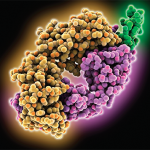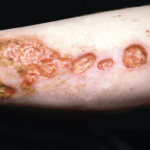More recent trials have shown that relapse rates are similar with the use of azathioprine or methotrexate (25 mg/week orally) and, surprisingly and disappointingly, higher with mycophenolate mofetil (2,000 mg/day) than with azathioprine.10,11 The latter study thereby provided some unintended reassurance that standard maintenance therapy is useful. Leflunomide at 30 mg/day was superior to methotrexate at 20 mg/week for remission maintenance in one small study, but the safety of that dose and, conversely, the efficacy of the more usual dose (20 mg/day) are unknown. Another study found that the addition of etanercept to standard maintenance therapy did not reduce relapse rates.12,13 Thus, azathioprine remains the best choice for patients with significant renal dysfunction or liver disease, methotrexate is an appropriate alternative for all other patients, and either leflunomide or mycophenolate remain options in the event that the other two drugs are contraindicated, poorly tolerated, or ineffective for a given patient. Whether there is a role for high-dose sulfamethoxizole-trimethoprim (one double-strength tablet twice daily) in addition to an immune-suppressive drug continues to be a source of debate, but this drug at this strength should not be used in combination with methotrexate.
National and international collaborations will ensure that the scientific basis for more effective and/or less toxic therapies will continue to expand.
Unanswered Questions in Maintenance Therapy
As mentioned above, the strategy of discontinuing maintenance treatment after 18–24 months is widely followed but somewhat arbitrary. A trial in progress in Europe (REMAIN) compares treatment for 18–24 months versus four years of therapy. Data from this trial on anti–PR3-positive and anti–MPO-positive subsets will also be of interest.
The use of low-dose glucocorticoids (prednisone or prednisolone 5–10 mg/day) as a standard component of maintenance therapy is a source of considerable controversy and varying practice among experts worldwide. Unfortunately, although this question is clearly amenable to a randomized trial, none have been done. As indicated above, comparing relapse rates between trials is problematic, due to different induction regimens, different percentages of anti–MPO-positive patients or newly diagnosed patients, different definitions of remission and relapse, and evaluation by different investigators in different countries. With those substantial caveats, a recent meta-analysis is notable for showing that trials in which glucocorticoids were routinely continued for 12–18 months (mostly European studies) reported markedly lower relapse rates than those in which they were discontinued earlier, usually by Month 6 (including most U.S. studies). None of the other variables that contributed to the heterogeneity of these trials was found to be associated with the relapse rate.14



